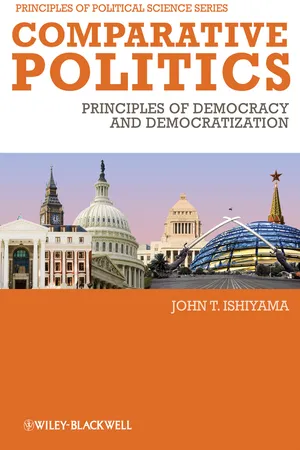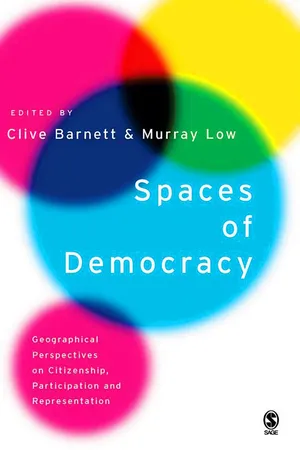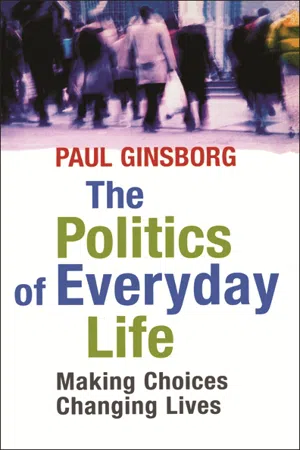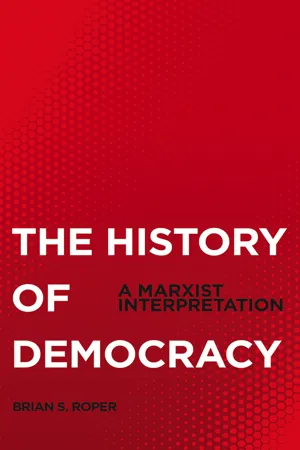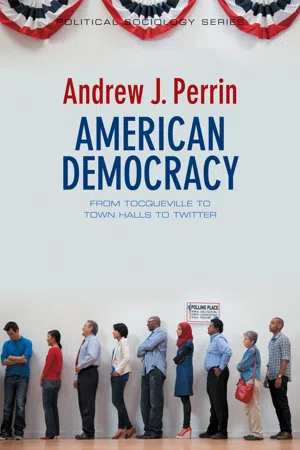History
Expansion of Democracy
The expansion of democracy refers to the broadening of political participation and rights within a society. This often involves extending voting rights to previously disenfranchised groups, such as women, minorities, and lower-income individuals. The expansion of democracy has been a key theme in many historical movements and has led to more inclusive and representative forms of government.
Written by Perlego with AI-assistance
Related key terms
6 Key excerpts on "Expansion of Democracy"
- eBook - ePub
Comparative Politics
Principles of Democracy and Democratization
- John T. Ishiyama(Author)
- 2011(Publication Date)
- Wiley-Blackwell(Publisher)
Some, like Freeman and Snidal (1982, p. 300) define democratization as the extension of citizenship and the franchise. Yet, this presupposes that meaningful elections take place and that political elites will abide by outcomes of such elections, which implies at least the notion that a rule of law exists and that leaders are accountable to someone. On the other hand, if we consider the minimal definition of democracy as the rule of law, the development of the institutions of civil society, the practice of free and fair elections and the establishment of accountability of those who govern, then democratization is the process by which the rule of law, elections and leadership accountability is established, and where civil society develops. Once established, the Expansion of Democracy involves extending the degree of competition and participation, through such mechanisms as broader enfranchisement (participation) and greater competition. A Historical Approach to Democratization Although different scholars emphasize different aspects of the historical development of democracy, nearly all note the socially and politically disruptive character of industrialization and economic modernization. Industrialization, it is argued, is a disruptive force which unleashes new social forces that can overwhelm existing political systems (Deutsch, 1961; Huntington, 1968; Gerschenkron, 1979). Industrialization creates “progressive” social classes such as the industrial bourgeoisie and the industrial proletariat, who lead the way to the construction of modern society. This creates political tensions for the old regime – these new social classes place demands for political participation on the existing political order, and challenge the right of the traditional elite (the landed nobility) to rule. In addition, industrialization also created social tensions between these new classes and the classes of the old feudal order, the peasantry and the landed nobility - eBook - ePub
Spaces of Democracy
Geographical Perspectives on Citizenship, Participation and Representation
- Clive Barnett, Murray Low, Clive Barnett, Murray Low(Authors)
- 2004(Publication Date)
- SAGE Publications Ltd(Publisher)
Elections, Voting and Representation2Global Democratization: Measuring and Explaining the Diffusion of Democracy
John O’Loughlin
Since Francis Fukuyama (1992: xi) declared that the ‘End of History’ had been reached because liberal democracy constitutes the ‘endpoint of mankind’s ideological motivation’ and is ‘the final form of human government’, a parallel debate has raged about whether liberal democracy, as practiced in the West, will diffuse and be accepted throughout the rest of the world. By the turn of the twenty-first century, few political leaders – even in authoritarian states – were willing to argue aloud against democracy since its virtues are now almost universally accepted. Global norms are fast coalescing around some key human and political freedoms, starting with the Universal Declaration of Human Rights (adopted by the UN General Assembly in 1948) and extending to the 1993 World Conference on Human Rights in Vienna (Diamond, 1999: 4). Democracy is essential to freedom and other inalienable rights because (a) free and fair elections require certain political rights of expression and these will co-exist with other liberties; (b) democracy maximises the opportunity for self-determination; and (c) democracy facilitates moral autonomy, the ability to make normative choices and to be self-governing (Diamond, 1999).Nobody disputes that the number of democratic states rose dramatically after the collapse of the Soviet Union and the end of Communist regimes in Eastern Europe. What remains in question is whether the new democracies are (a) stable; (b) truly democratic or only veneer expressions of democracy while real power still rests with autocrats; and (c) whether there is a general global process or whether recent developments are the independent results of separate and unpredictable domestic circumstances. After the end of the Cold War, a paradigm shift is recognisable in the study of democratisation. Rather than seeing political developments as separate events, researchers turned to seeing them as connected within a cascading pattern and thus part of a ‘Third Wave’ of democratisation (Huntington, 1991). The structural model of predictability implicit in a cascading wave, in turn presupposing a structural trend, is now viewed skeptically by students of comparative politics who focus on national differences (Schwartzman, 1998). In political science, an argument has erupted about whether one can compare polities across regions (Inglehart and Carballo, 1997). - eBook - ePub
- Ginsborg, Paul(Authors)
- 2013(Publication Date)
- Melbourne University Press Digital(Publisher)
The second reason for insisting on the potential universality of democracy is the modern mirror of the first. All over the world in the twentieth century and at the beginning of the twenty-first, individuals and groups, some extremely courageous, have fought for the cause of democracy. For the most part, they have done so not because it forms part of the ideology of American imperialism, but because they consider it to be the fairest political system yet invented, even if it is far from perfect. Often they have been minorities in their own countries, sometimes, as in China, very small minorities, but that does not mean that we should ignore their efforts. Nor should we ever let the arbitrary concentration of power be justified in the name of a dubious cultural relativism.Expansion, crisis and disaffection
In the global Expansion of Democracy historians have usually distinguished a number of successive phases.20 The first ‘long’ wave of democratisation covers the period from the first decades of the nineteenth century to 1926. By that time there were just twenty-nine democracies in the whole world – though the figure would be much smaller if the definition I have just outlined above was rigidly applied. Mussolini’s assumption of dictatorial power in Italy then began a ‘reverse wave’, which saw the number of democracies shrink to twelve by 1942. This was democracy’s darkest hour. After the Second World War, as was only to be expected, there was a return to expansion, which reached its peak in 1962 with thirty-six countries enjoying democratic government of one sort or another. In the 1970s and 1980s there was a further expansion, primarily in Catholic countries, beginning in Portugal and Spain and then sweeping rather uncertainly through south and central America. However, the really dramatic breakthrough took place in the twelve years after the fall of the Berlin wall. In 1988 only 66 states out of the then total of 167 in the United Nations claimed democratic credentials. By the year 2000 120 out of the 192 member countries in the United Nations, or 62.5 per cent did so. For the first time democracy had acquired majority status on a world scale.21This enormously significant fact, one of the few in this book to constitute a firm basis for optimism,22 has to be inspected carefully. Larry Diamond and Marc Plattner have made a first broad division of the 120 democratic countries of the United Nations, separating them into ‘electoral’ and ‘liberal’ democracies. To belong to the first category, it is sufficient to satisfy a single criterion: that of holding ‘regular, free and fair’ elections among competing parties. The second and more demanding category, that of ‘liberal’ democracy, requires a further five criteria. The first concerns civil liberties. A democracy can only be considered liberal if freedom of belief, expression, organisation, protest and assembly is properly safeguarded. Secondly, under the rule of law all citizens must be treated equally and due process be secure. Thirdly, the judiciary must be independent and neutral, not subordinate to the executive or any political faction; at the same time, institutions of ‘horizontal accountability’, such as the central bank or the ‘watchdog’ for the media, have to be autonomous and endowed with effective powers. Fourthly, in a liberal democracy there must be clear evidence of the existence of an open and pluralist civil society; an essential part of it consists in free mass media. Lastly, the armed forces must be clearly under the control of the democratically elected government.23 - eBook - ePub
Can Democracy Be Saved?
Participation, Deliberation and Social Movements
- Donatella della Porta(Author)
- 2013(Publication Date)
- Polity(Publisher)
In this vision, participation must be limited and channelled in order to avoid an overload in demands, particularly from infantile citizens. Indeed, J. A. Schumpeter underlined that ‘the electors must respect the division of labour between themselves and the politicians they elect. They must not withdraw their trust too easily in the interval between one election and another and they must understand that from the moment they have elected someone, political action is his competence and not theirs’ (1967, 280–1). Even letters and petitions would, in this view, reduce the necessary freedom of action of the representative (1967, 280–1).According to a much discussed study, in the 1970s it was the growth in participation that threatened the ‘disintegration of the civil order, the breakdown of social discipline, the debility of leaders, and the alienation of citizens’ (Crozier, Huntington and Watakuni 1975, 2). The governments of the United States and European democracies were described here as being subjected to excessive stress as a result of the growth in participation, seen as a challenge to institutions. According to Huntington (1975, 37–8), the problem of Western governments derived from an ‘excess of democracy’: ‘The effective operation of a democratic political system normally requires some measure of apathy and disengagement in the population. The vulnerability of the democratic government in the United States derives from the internal dynamics of democracy in a highly educated, mobilized and participatory society.’ The paradox was that it was precisely those most educated groups that seemed to present the greatest danger for democracy – as they were the ones that placed most demands on the system.The emergence of democracy in the liberal stateThe history of democratic regimes, defined by the right to vote for all citizens, is brief. As observed by Dahl (1998, 5–6), ‘if we accept universal adult suffrages as a requirement of democracy, there would be some persons in practically every democratic country who would be older than their democratic system of government’. The concept of democracy has, however, a history thousands of years long.Democracy, as developed in the last century, has some distant predecessors where the first rumblings of democracy developed. Some of the independent cities in Greece and the Roman republic in 500 BC are in fact often referred to as examples of forms of government that foresaw the participation of a consistent number of citizens. Specifically, in Athens between 500 and 300 BC, an assembly open to all those who enjoyed the status of citizens assigned some administrative posts, while others were decided by drawing lots. Limited forms of popular government were also seen in ancient Rome up to 100 BC. After 1,200 years, forms of popular participation in government then re-emerged, in particular in the city-states of northern Italy, and survived for around two centuries (Dahl 1998). - eBook - ePub
The History of Democracy
A Marxist Interpretation
- Brian S. Roper(Author)
- 2012(Publication Date)
- Pluto Press(Publisher)
8
Capitalist expansion, globalisation and democratisation INTRODUCTIONThe historical emergence and development of capitalism has created social and economic conditions conducive to the emergence and consolidation of representative democracy. There is widespread scholarly agreement on this point and equally widespread disagreement concerning why capitalist development has, with important exceptions, been positively correlated with democratisation. As established in previous chapters, capitalist development has created social and economic conditions conducive to the emergence of representative democracy because it destroyed feudalism, with its ties of personal obligation and coercive compulsion binding serfs or peasants to landowning nobles, and greatly strengthened the social classes that have most consistently promoted democracy, namely the working class and independent capitalist farmers (Rueschemeyer, Stephens and Stephens, 1992: 6–8; Therborn, 1977: 23–8). This chapter completes the account of the historical emergence of representative democracy by providing an account of the period from the end of the revolutions in which the bourgeoisie played a leading and progressive role, the last being the American Civil War of 1861–65, to the present. Specifically, this chapter focuses on the geographical expansion of capitalism, the extension of the electoral franchise in the advanced capitalist societies, the growing proportion and number of countries that can be categorised as representative democracies, and the aspects of globalisation that are creating significant problems for representative democracy.CAPITALIST EXPANSION ON A GLOBAL SCALECapitalism has sustained a qualitatively higher rate of expansion than any previous mode of production in world history. From its geographically small origins in England and the Netherlands during the fifteenth and sixteenth centuries, capitalism has spread to engulf the planet. As early as 1848 Marx and Engels observed: - eBook - ePub
American Democracy
From Tocqueville to Town Halls to Twitter
- Andrew J. Perrin(Author)
- 2014(Publication Date)
- Polity(Publisher)
modernity: a period of social life characterized by industrial development, scientific and technological progress, alongside poverty and strife, in which our concept of the individual and her relationship with society emerged (Berman 1982; Bauman 2001). At each point in time, publics confront the technologies, institutions, and practices of the time and consider how to use or reconfigure them to respond to the issues of the day. The ways they deploy, change, and create new technologies, institutions, and practices provide the resources for future interactions. That’s the best model for thinking about democratic publics at a single point in time. Set that model in motion over time, and those publics use memories of prior experiences and orientations to the future (Mische 2009) to shape their relationships to these practices, technologies, and institutions.Table 1 Key moments in the development of democracyTime range Historical development Scope and conception of citizenship and democracy 500 BC Athenian democracy Relatively direct, limited participation; emergence of the term “democracy” Thirteenth–fourteenth centuries Emergence of modern democratic practices in Europe (England and Venice) Eighteenth century American and French Revolutions Modern idea of the citizen, legitimacy of popular sovereignty; invention of “the people” as political subject Early nineteenth century Abolitionism Populist protest as a political vehicle Late nineteenth century Reconstruction, women’s suffrage movement Expansion of citizenship rights; expansion of “the people” as inclusive, individualist idea; party patronage and vigorous civic life Early twentieth century Progressive era Rationalization of politics; individual voting; secret ballot; expansion to near-universal suffrage 1930s New Deal Expansion of federal power; political reach in protecting people from economic ruin 1950–89 Postwar/Cold War “Self-determination” as world standard; anti-Soviet focus; civil rights movement
Index pages curate the most relevant extracts from our library of academic textbooks. They’ve been created using an in-house natural language model (NLM), each adding context and meaning to key research topics.
